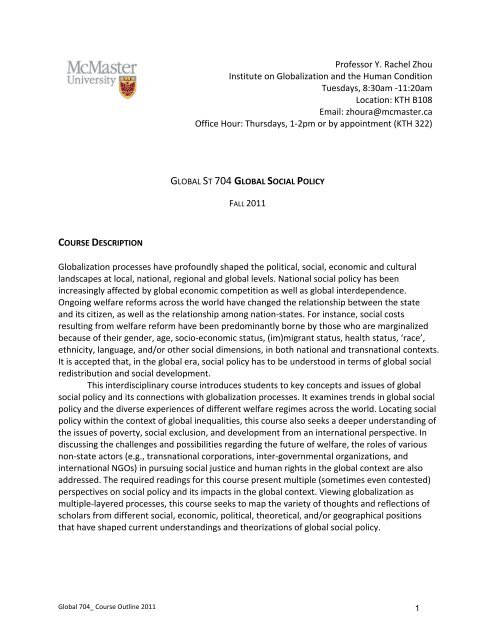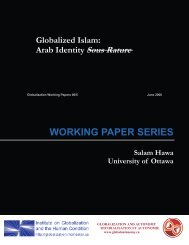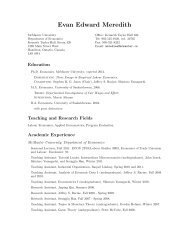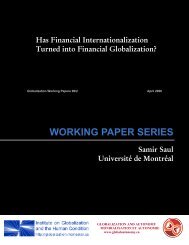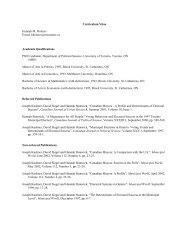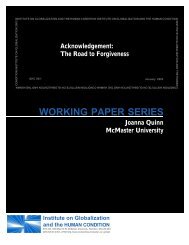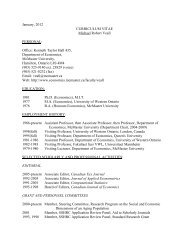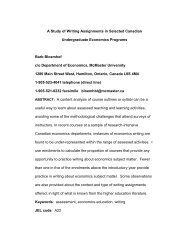Professor Y. Rachel Zhou Institute on Globalization and the Human ...
Professor Y. Rachel Zhou Institute on Globalization and the Human ...
Professor Y. Rachel Zhou Institute on Globalization and the Human ...
Create successful ePaper yourself
Turn your PDF publications into a flip-book with our unique Google optimized e-Paper software.
<str<strong>on</strong>g>Professor</str<strong>on</strong>g> Y. <str<strong>on</strong>g>Rachel</str<strong>on</strong>g> <str<strong>on</strong>g>Zhou</str<strong>on</strong>g><br />
<str<strong>on</strong>g>Institute</str<strong>on</strong>g> <strong>on</strong> Globalizati<strong>on</strong> <strong>and</strong> <strong>the</strong> <strong>Human</strong> C<strong>on</strong>diti<strong>on</strong><br />
Tuesdays, 8:30am ‐11:20am<br />
Locati<strong>on</strong>: KTH B108<br />
Email: zhoura@mcmaster.ca<br />
Office Hour: Thursdays, 1‐2pm or by appointment (KTH 322)<br />
GLOBAL ST 704 GLOBAL SOCIAL POLICY<br />
FALL 2011<br />
COURSE DESCRIPTION<br />
Globalizati<strong>on</strong> processes have profoundly shaped <strong>the</strong> political, social, ec<strong>on</strong>omic <strong>and</strong> cultural<br />
l<strong>and</strong>scapes at local, nati<strong>on</strong>al, regi<strong>on</strong>al <strong>and</strong> global levels. Nati<strong>on</strong>al social policy has been<br />
increasingly affected by global ec<strong>on</strong>omic competiti<strong>on</strong> as well as global interdependence.<br />
Ongoing welfare reforms across <strong>the</strong> world have changed <strong>the</strong> relati<strong>on</strong>ship between <strong>the</strong> state<br />
<strong>and</strong> its citizen, as well as <strong>the</strong> relati<strong>on</strong>ship am<strong>on</strong>g nati<strong>on</strong>‐states. For instance, social costs<br />
resulting from welfare reform have been predominantly borne by those who are marginalized<br />
because of <strong>the</strong>ir gender, age, socio‐ec<strong>on</strong>omic status, (im)migrant status, health status, ‘race’,<br />
ethnicity, language, <strong>and</strong>/or o<strong>the</strong>r social dimensi<strong>on</strong>s, in both nati<strong>on</strong>al <strong>and</strong> transnati<strong>on</strong>al c<strong>on</strong>texts.<br />
It is accepted that, in <strong>the</strong> global era, social policy has to be understood in terms of global social<br />
redistributi<strong>on</strong> <strong>and</strong> social development.<br />
This interdisciplinary course introduces students to key c<strong>on</strong>cepts <strong>and</strong> issues of global<br />
social policy <strong>and</strong> its c<strong>on</strong>necti<strong>on</strong>s with globalizati<strong>on</strong> processes. It examines trends in global social<br />
policy <strong>and</strong> <strong>the</strong> diverse experiences of different welfare regimes across <strong>the</strong> world. Locating social<br />
policy within <strong>the</strong> c<strong>on</strong>text of global inequalities, this course also seeks a deeper underst<strong>and</strong>ing of<br />
<strong>the</strong> issues of poverty, social exclusi<strong>on</strong>, <strong>and</strong> development from an internati<strong>on</strong>al perspective. In<br />
discussing <strong>the</strong> challenges <strong>and</strong> possibilities regarding <strong>the</strong> future of welfare, <strong>the</strong> roles of various<br />
n<strong>on</strong>‐state actors (e.g., transnati<strong>on</strong>al corporati<strong>on</strong>s, inter‐governmental organizati<strong>on</strong>s, <strong>and</strong><br />
internati<strong>on</strong>al NGOs) in pursuing social justice <strong>and</strong> human rights in <strong>the</strong> global c<strong>on</strong>text are also<br />
addressed. The required readings for this course present multiple (sometimes even c<strong>on</strong>tested)<br />
perspectives <strong>on</strong> social policy <strong>and</strong> its impacts in <strong>the</strong> global c<strong>on</strong>text. Viewing globalizati<strong>on</strong> as<br />
multiple‐layered processes, this course seeks to map <strong>the</strong> variety of thoughts <strong>and</strong> reflecti<strong>on</strong>s of<br />
scholars from different social, ec<strong>on</strong>omic, political, <strong>the</strong>oretical, <strong>and</strong>/or geographical positi<strong>on</strong>s<br />
that have shaped current underst<strong>and</strong>ings <strong>and</strong> <strong>the</strong>orizati<strong>on</strong>s of global social policy.<br />
Global 704_ Course Outline 2011 1
COURSE OBJECTIVES<br />
• To underst<strong>and</strong> <strong>the</strong> relati<strong>on</strong>ship between globalizati<strong>on</strong> <strong>and</strong> social policy;<br />
• To underst<strong>and</strong> <strong>the</strong> global <strong>and</strong> local c<strong>on</strong>text of social policy making <strong>and</strong> its<br />
implementati<strong>on</strong>;<br />
• To underst<strong>and</strong> <strong>the</strong> interacti<strong>on</strong> between global social policy <strong>and</strong> social <strong>and</strong> human<br />
development in local, nati<strong>on</strong>al <strong>and</strong> transnati<strong>on</strong>al c<strong>on</strong>texts;<br />
• To recognize <strong>and</strong> reflect <strong>on</strong> <strong>the</strong> perspectives underpinning various social policy<br />
resp<strong>on</strong>ses at both local <strong>and</strong> global levels;<br />
• To develop critical thinking of local‐global c<strong>on</strong>necti<strong>on</strong>s in <strong>the</strong> c<strong>on</strong>text of social policy;<br />
• To underst<strong>and</strong> <strong>and</strong> address social justice issues arising out of globalizati<strong>on</strong> processes<br />
<strong>and</strong> <strong>the</strong> processes of social policy making <strong>and</strong> implementati<strong>on</strong>.<br />
REQUIRED TEXTS<br />
1. Yeates, N. (Ed.) (2008). Underst<strong>and</strong>ing global social policy. Bristol, UK: The Policy Press.<br />
2. Huds<strong>on</strong>, J., Kuhner, S., & Lowe, S. (2008). The short guide to social policy. Bristol, UK: The<br />
Policy Press.<br />
3. Steger, M. B. (2003). Globalizati<strong>on</strong>: A very short introducti<strong>on</strong>. Oxford: Oxford University<br />
Press.<br />
4. The readings (scholarly journal articles <strong>and</strong> reports) can be accessed through <strong>the</strong> electr<strong>on</strong>ic<br />
system of McMaster University Library or <strong>the</strong> websites indicated. For more informati<strong>on</strong><br />
about how to find an electr<strong>on</strong>ic article, go to<br />
http://library.mcmaster.ca/find/findejournals.htm.<br />
*Note: You can purchase <strong>the</strong> required textbooks as well as <strong>the</strong> course pack that c<strong>on</strong>sists of all<br />
required readings at Titles McMaster University Bookstore.<br />
COURSE EVALUATION<br />
1. Participati<strong>on</strong> (10%)<br />
Students’ attendance <strong>and</strong> participati<strong>on</strong> are crucial for this course. They are expected to come<br />
to class <strong>on</strong> time, complete <strong>the</strong> required readings, <strong>and</strong> take an active part in <strong>the</strong> discussi<strong>on</strong>.<br />
2. In‐class presentati<strong>on</strong> (15%)<br />
Each student will be resp<strong>on</strong>sible for giving a presentati<strong>on</strong> (10%) based <strong>on</strong> <strong>the</strong> readings of a<br />
particular week <strong>and</strong> for preparing critical questi<strong>on</strong>s to be circulated in advance (5%) for class<br />
discussi<strong>on</strong>.<br />
Global 704_ Course Outline 2011 2
The main objective of this presentati<strong>on</strong> is to share your underst<strong>and</strong>ing, interpretati<strong>on</strong>s<br />
<strong>and</strong> critiques of <strong>the</strong> readings. The length of <strong>the</strong> presentati<strong>on</strong> will be around 25 minutes, but<br />
may be five minutes l<strong>on</strong>ger if two or more students co‐present.<br />
The questi<strong>on</strong>s that will be circulated in advance are expected to lead to a discussi<strong>on</strong> that<br />
can enrich students’ underst<strong>and</strong>ing of individual articles, as well as <strong>the</strong> week’s topic. Students<br />
should send <strong>the</strong> questi<strong>on</strong>s to <strong>the</strong> instructor at least two days before <strong>the</strong> class for feedback (or<br />
suggesti<strong>on</strong>s for revisi<strong>on</strong>s) before sending <strong>the</strong>m to all students before <strong>the</strong> class. Although it is<br />
not m<strong>and</strong>atory, students are encouraged to facilitate (or co‐facilitate, if you are presenting with<br />
a partner) <strong>the</strong> discussi<strong>on</strong> of <strong>the</strong>se questi<strong>on</strong>s.<br />
3. Resp<strong>on</strong>se Paper (25%)<br />
In <strong>the</strong> resp<strong>on</strong>se paper students are expected to develop <strong>the</strong>ir own argument <strong>on</strong> an issue arising<br />
out of <strong>the</strong> readings of a particular week through a comprehensive <strong>and</strong> critical review of all of<br />
those readings. The topics students select should NOT overlap with those <strong>the</strong>y choose for <strong>the</strong>ir<br />
in‐class presentati<strong>on</strong>s. The paper (in hard copy) must be submitted in class <strong>on</strong> <strong>the</strong> day we<br />
address those readings. No outside research is necessary for a resp<strong>on</strong>se paper. The paper<br />
should be double‐spaced, 8‐10 pages (about 2,000‐2,500 words). The last day to submit <strong>the</strong><br />
sec<strong>on</strong>d resp<strong>on</strong>se paper is November 29, 2011.<br />
4. Final Paper (50%)<br />
In <strong>the</strong> final paper students are expected to engage in an in‐depth discussi<strong>on</strong> <strong>on</strong> an issue arising<br />
out of <strong>the</strong> course (required readings, class discussi<strong>on</strong>, as well as o<strong>the</strong>r GSP related issues). This<br />
paper may exp<strong>and</strong> <strong>on</strong> <strong>the</strong>mes developed in <strong>the</strong> shorter resp<strong>on</strong>se paper. C<strong>on</strong>sultati<strong>on</strong> can be<br />
arranged to help students prepare this assignment. The paper should be double‐spaced, 18‐20<br />
pages (4,500‐5,000 words, excluding references), <strong>and</strong> submitted both electr<strong>on</strong>ically via email<br />
<strong>and</strong> in hard copy. It is due <strong>on</strong> M<strong>on</strong>day, December 12, 2011.<br />
ASSIGNMENT SUBMISSION<br />
Assignments must be submitted <strong>on</strong> <strong>the</strong> due date by <strong>the</strong> end of class. A 2% reducti<strong>on</strong> will be<br />
applied each day (i.e., M<strong>on</strong>day ‐ Sunday) after <strong>the</strong> due date. Assignments that are not<br />
submitted within a week after <strong>the</strong>ir due date will automatically receive a grade of zero.<br />
Assignments h<strong>and</strong>ed in to <strong>the</strong> <str<strong>on</strong>g>Institute</str<strong>on</strong>g> Office (or Social Work Office, KTH 319) must have <strong>the</strong><br />
date stamped <strong>on</strong> <strong>the</strong> fr<strong>on</strong>t cover. In additi<strong>on</strong>, please adhere to <strong>the</strong> following criteria for<br />
assignment preparati<strong>on</strong>:<br />
1. All assignments must include a title page with all relevant course informati<strong>on</strong>, adhere<br />
to <strong>the</strong> page limits specified, be formatted with 12 pt. f<strong>on</strong>t <strong>and</strong> st<strong>and</strong>ard margins, <strong>and</strong><br />
be stapled;<br />
2. The citati<strong>on</strong>s <strong>and</strong> references in all assignments (if applicable) must use APA style: more<br />
informati<strong>on</strong> is available through <strong>the</strong> e‐Resources link <strong>on</strong> <strong>the</strong> library home page<br />
http://library.mcmaster.ca <strong>and</strong> at http://www.apastyle.org.<br />
Global 704_ Course Outline 2011 3
ACADEMIC DISHONESTY<br />
Academic dish<strong>on</strong>esty c<strong>on</strong>sists of misrepresentati<strong>on</strong> by decepti<strong>on</strong> or by o<strong>the</strong>r fraudulent means<br />
<strong>and</strong> can result in serious c<strong>on</strong>sequences, e.g. <strong>the</strong> grade of zero <strong>on</strong> an assignment, loss of credit<br />
with a notati<strong>on</strong> <strong>on</strong> <strong>the</strong> transcript (notati<strong>on</strong> reads: “Grade of F assigned for academic<br />
dish<strong>on</strong>esty”), <strong>and</strong>/or suspensi<strong>on</strong> or expulsi<strong>on</strong> from <strong>the</strong> university. It is <strong>the</strong> student’s<br />
resp<strong>on</strong>sibility to underst<strong>and</strong> what c<strong>on</strong>stitutes academic dish<strong>on</strong>esty. For informati<strong>on</strong> <strong>on</strong> <strong>the</strong><br />
various kinds of academic dish<strong>on</strong>esty please refer to <strong>the</strong> Academic Integrity Policy, specifically<br />
Appendix 3 at http://www.mcmaster.ca/senate/academic/ac_integrity.htm.<br />
The following illustrates <strong>on</strong>ly three forms of academic dish<strong>on</strong>esty: a) plagiarism, e.g. <strong>the</strong><br />
submissi<strong>on</strong> of work that is not <strong>on</strong>e’s own or for which o<strong>the</strong>r credit has been obtained; b)<br />
improper collaborati<strong>on</strong> in group work; or c) copying or using unauthorized aids in tests <strong>and</strong><br />
examinati<strong>on</strong>s.<br />
ACADEMIC SUPPORT SERVICES<br />
Centre for Student Development offers academic support services (e.g., writing skills, time<br />
management, internati<strong>on</strong>al student services, <strong>and</strong> pers<strong>on</strong>al counselling). Detailed informati<strong>on</strong> is<br />
available at http://csd.mcmaster.ca/.<br />
FACULTY OF SOCIAL SCIENCES EMAIL COMMUNICATION POLICY<br />
Effective September 1, 2010, it is <strong>the</strong> policy of <strong>the</strong> Faculty of Social Sciences that all e‐mail<br />
communicati<strong>on</strong> sent from students to instructors (including TAs), <strong>and</strong> from students to staff,<br />
must originate from <strong>the</strong> student’s own McMaster University e‐mail account. This policy<br />
protects c<strong>on</strong>fidentiality <strong>and</strong> c<strong>on</strong>firms <strong>the</strong> identity of <strong>the</strong> student. It is <strong>the</strong> student’s<br />
resp<strong>on</strong>sibility to ensure that communicati<strong>on</strong> is sent to <strong>the</strong> university from a McMaster account.<br />
If an instructor becomes aware that a communicati<strong>on</strong> has come from an alternate address, <strong>the</strong><br />
instructor may not reply at his or her discreti<strong>on</strong>.<br />
Email Forwarding in MUGSI: http://www.mcmaster.ca/uts/support/email/emailforward.html<br />
*Forwarding will take effect 24‐hours after students complete <strong>the</strong> process at <strong>the</strong> above link<br />
The instructor <strong>and</strong> university reserve <strong>the</strong> right to modify elements of <strong>the</strong> course during <strong>the</strong><br />
term. The university may change <strong>the</strong> dates <strong>and</strong> deadlines for any or all courses in extreme<br />
circumstances. If ei<strong>the</strong>r type of modificati<strong>on</strong> becomes necessary, reas<strong>on</strong>able notice <strong>and</strong><br />
communicati<strong>on</strong> with <strong>the</strong> students will be given with explanati<strong>on</strong> <strong>and</strong> <strong>the</strong> opportunity to<br />
comment <strong>on</strong> changes. It is <strong>the</strong> resp<strong>on</strong>sibility of <strong>the</strong> student to check his/her McMaster email<br />
<strong>and</strong> course websites weekly during <strong>the</strong> term <strong>and</strong> to note any changes.<br />
Global 704_ Course Outline 2011 4
TENTATIVE CLASS SCHEDULE<br />
Note: If you officially registered for <strong>the</strong> course, you were automatically enrolled in <strong>the</strong> database<br />
of <strong>the</strong> Avenue to Learn (http://avenue.mcmaster.ca/).<br />
Sept. 13<br />
Introducti<strong>on</strong><br />
Introducti<strong>on</strong> to this course <strong>and</strong> <strong>the</strong> assignments (No readings).<br />
Sept. 20<br />
Introducti<strong>on</strong>: Globalizati<strong>on</strong>, social policy, <strong>and</strong> <strong>the</strong>ir relati<strong>on</strong>ships<br />
Huds<strong>on</strong>, J., Kuhner, S., & Lowe, S. (2008). The short guide to social policy. Bristol, UK: The Policy<br />
Press.<br />
Steger, M. B. (2003). Globalizati<strong>on</strong>: A very short introducti<strong>on</strong>. Oxford: Oxford University Press.<br />
* To better underst<strong>and</strong> <strong>the</strong> relati<strong>on</strong>ship between globalizati<strong>on</strong> <strong>and</strong> social policy, you should first<br />
get acquainted with those two key c<strong>on</strong>cepts through <strong>the</strong> required readings. You will share, in<br />
class, your underst<strong>and</strong>ing of globalizati<strong>on</strong> <strong>and</strong> social policy: covering such aspects as definiti<strong>on</strong>s,<br />
key issues, examples, debates, puzzles, questi<strong>on</strong>s, <strong>and</strong> reflecti<strong>on</strong>s. Based <strong>on</strong> what is said <strong>the</strong>n,<br />
we will have a preliminary discussi<strong>on</strong> <strong>on</strong> <strong>the</strong> relati<strong>on</strong>ship between <strong>the</strong>m.<br />
Sept. 27<br />
What is “global social policy”?<br />
Yeates, N. (2008). The idea of global social policy. In N. Yeates (Ed.), Underst<strong>and</strong>ing global social<br />
policy (pp.1‐24). Bristol, UK: The Policy Press.<br />
Deac<strong>on</strong>, B. (2008). Global <strong>and</strong> regi<strong>on</strong>al social governance. In N. Yeates (Ed.), Underst<strong>and</strong>ing<br />
global social policy (pp.25‐48). Bristol, UK: The Policy Press.<br />
Hulme, R., & Hulme, M. (2008). The global transfer of social policy. In N. Yeates (Ed.),<br />
Underst<strong>and</strong>ing global social policy (pp.49‐72). Bristol, UK: The Policy Press.<br />
Suddath, C. (2010). Who are gypsies, <strong>and</strong> why is France deporting <strong>the</strong>m? Time Magazine,<br />
August 26. Available at:<br />
http://www.time.com/time/world/article/0,8599,2013917,00.html#ixzz0ziYs6shW<br />
Oct. 4<br />
Social welfare <strong>and</strong> social justice in a c<strong>on</strong>text of globalizati<strong>on</strong><br />
*<str<strong>on</strong>g>Zhou</str<strong>on</strong>g>, Y. R. (2009). Welfare. In G. H. Fagan & R. Munck (Eds.), Encyclopedia of Globalisati<strong>on</strong><br />
<strong>and</strong> Security (pp. 387‐404). US: Praeger Press.<br />
Global 704_ Course Outline 2011 5
Holdren, C. (2008). Internati<strong>on</strong>al trade <strong>and</strong> welfare. In N. Yeates (Ed.), Underst<strong>and</strong>ing global<br />
social policy (pp.101‐122). Bristol, UK: The Policy Press.<br />
Mills, M. (2009). Globalizati<strong>on</strong> <strong>and</strong> Inequality. European Sociological Review, 25 (1), 1‐8.<br />
Clarke, J. (2005). Welfare states as nati<strong>on</strong> states: Some c<strong>on</strong>ceptual reflecti<strong>on</strong>s. Social Policy &<br />
Society, 4(4), 407‐ 415.<br />
Young, I. M. (2006). Resp<strong>on</strong>sibility <strong>and</strong> global justice: A social c<strong>on</strong>necti<strong>on</strong> model. Social<br />
Philosophy <strong>and</strong> Policy, 23 (1), 102‐130.<br />
Oct. 11<br />
Welfare states, globalizati<strong>on</strong>, <strong>and</strong> (bey<strong>on</strong>d) neoliberalism<br />
Larner, W. (2000). Neo‐liberalism: Policy, ideology, governmentality. Studies in Political<br />
Ec<strong>on</strong>omy, 63, 5‐26.<br />
Hartman, Y. (2005). In bed with <strong>the</strong> enemy: Some ideas <strong>on</strong> <strong>the</strong> c<strong>on</strong>necti<strong>on</strong>s between<br />
Neoliberalism <strong>and</strong> <strong>the</strong> welfare state. Current Sociology, 53, 57‐73.<br />
Hermann, C. (2007). Neoliberalism in <strong>the</strong> European Uni<strong>on</strong>. Studies in Political Ec<strong>on</strong>omy, 79, 61‐<br />
89.<br />
Jens<strong>on</strong>, J. (2010). Diffusing ideas for after neoliberalism: The social investment perspective in<br />
Europe <strong>and</strong> Latin America. Global Social Policy, 10, 59‐84.<br />
*Suggested reading (opti<strong>on</strong>al): Cheng, T. (2007). How is “welfare-to-work” shaped by<br />
c<strong>on</strong>tingencies of ec<strong>on</strong>omy, welfare policy <strong>and</strong> human capital? Internati<strong>on</strong>al Journal of Social<br />
Welfare, 16 (3), 212-219.<br />
Oct. 18<br />
Social policy reforms in development c<strong>on</strong>texts<br />
Mares, I., & Carnes M. E. (2009). Social policy in developing countries. Annual Review of Political<br />
Science, 12, 93‐113.<br />
Barrientos, A., & Hulme, D. (2009). Social protecti<strong>on</strong> for <strong>the</strong> poor <strong>and</strong> poorest in developing<br />
countries: Reflecti<strong>on</strong>s <strong>on</strong> a quiet revoluti<strong>on</strong> (Commentary). Oxford Development Studies, 37(4),<br />
439‐459.<br />
Kw<strong>on</strong>, H. (2009). The reform of <strong>the</strong> developmental welfare state in East Asia. Internati<strong>on</strong>al<br />
Journal of Social Welfare, 18 (s1), S12‐S21.<br />
Global 704_ Course Outline 2011 6
<str<strong>on</strong>g>Zhou</str<strong>on</strong>g>, Y. R. (2008). Ec<strong>on</strong>omic reform, neoliberal globalizati<strong>on</strong> <strong>and</strong> social policy: Rec<strong>on</strong>structing<br />
<strong>the</strong> relati<strong>on</strong>ship between <strong>the</strong> state, <strong>the</strong> market <strong>and</strong> citizens in China. Global Social Policy, 8 (1),<br />
115‐128.<br />
Nels<strong>on</strong>, J. M. (2011). Social policy reforms in Latin America: Urgent but frustrating. Latin<br />
American Research Review, 46(1), 226‐239.<br />
Adesina, J. (2009). Social policy in sub‐Saharan Africa: A glance in <strong>the</strong> rear‐view mirror.<br />
Internati<strong>on</strong>al Journal of Social Welfare, 18 (S1), S37‐S51.<br />
*Suggested readings (opti<strong>on</strong>al): Devereux, S., & White, P. (2010). Social Protecti<strong>on</strong> in Africa:<br />
Evidence, Politics <strong>and</strong> Rights. Poverty & Public Policy, 2 (3), 53-77.<br />
Riesco, M. (2009). Latin America: a new developmental welfare state model in <strong>the</strong> making?<br />
Internati<strong>on</strong>al Journal of Social Welfare, 18 (s1), S22-S36.<br />
Kw<strong>on</strong>, S., & Holliday, I. (2007).The Korean welfare state: a paradox of expansi<strong>on</strong> in an era of<br />
globalisati<strong>on</strong> <strong>and</strong> ec<strong>on</strong>omic crisis. Internati<strong>on</strong>al Journal of Social Welfare, 16 (3), 242-248.<br />
Taylor, M. (2003). The reformulati<strong>on</strong> of social policy in Chile, 1973-2001: Questi<strong>on</strong>ing a<br />
neoliberal model. Global Social Policy, 3(1), 21-44.<br />
Oct. 25<br />
Global labour: Rights, st<strong>and</strong>ards, <strong>and</strong> challenges<br />
O’Brien, R. (2008). Global labour policy. In N. Yeates (Ed.), Underst<strong>and</strong>ing global social policy<br />
(pp.123‐148). Bristol, UK: The Policy Press.<br />
Internati<strong>on</strong>al Labour Organizati<strong>on</strong> (2010). Executive summary of <strong>the</strong> world of work report 2010:<br />
From <strong>on</strong>e crisis to <strong>the</strong> next? Available at:<br />
http://www.ilo.org/wcmsp5/groups/public/@dgreports/@dcomm/documents/publicati<strong>on</strong>/wc<br />
ms_145112.pdf<br />
Spilerman, S. (2009). How globalizati<strong>on</strong> has impacted labour: A review essay. European<br />
Sociological Review, 25 (1), 73‐86.<br />
St<strong>and</strong>ing, G. (2008). The ILO: An Agency for Globalizati<strong>on</strong>? Development <strong>and</strong> Change, 39 (3),<br />
355‐384.<br />
Wells, D. (2009). Local worker struggles in <strong>the</strong> global South: rec<strong>on</strong>sidering Nor<strong>the</strong>rn impacts <strong>on</strong><br />
internati<strong>on</strong>al labour st<strong>and</strong>ards. Third World Quarterly, 30(3), 567‐579.<br />
*Suggested readings (opti<strong>on</strong>al): Wickramasekara, P. (2008). Globalisati<strong>on</strong>, internati<strong>on</strong>al labour<br />
migrati<strong>on</strong> <strong>and</strong> <strong>the</strong> rights of migrant workers. Third World Quarterly, 29 (7), 1247 – 1264.<br />
Global 704_ Course Outline 2011 7
Wise, R. D. (2006). Migrati<strong>on</strong> <strong>and</strong> imperialism: The Mexican workforce in <strong>the</strong> c<strong>on</strong>text of<br />
NAFTA. Latin American Perspectives, 33, 33-45.<br />
Kabeer, N. (2004). Globalizati<strong>on</strong>, labour st<strong>and</strong>ards, <strong>and</strong> women’s rights: Dilemmas of collective<br />
(in)acti<strong>on</strong> in an interdependent world. Feminist Ec<strong>on</strong>omics, 10 (1), 3 – 35.<br />
Nadvi, K. (2008). Global st<strong>and</strong>ards, global governance <strong>and</strong> <strong>the</strong> organizati<strong>on</strong> of global value<br />
chains. Journal of Ec<strong>on</strong>omic Geography, 8(3), 323-343.<br />
Orbie J., & Babarinde, O. (2008). The social dimensi<strong>on</strong> of globalizati<strong>on</strong> <strong>and</strong> EU development<br />
policy: Promoting core labour st<strong>and</strong>ards <strong>and</strong> corporate social resp<strong>on</strong>sibility. Journal of European<br />
Integrati<strong>on</strong>, 30(3), 459 – 477.<br />
Nov. 1<br />
Internati<strong>on</strong>al migrati<strong>on</strong>: Mobility, development, <strong>and</strong> management<br />
Yeates, N. (2008). Global migrati<strong>on</strong> policy. In N. Yeates (Ed.), Underst<strong>and</strong>ing global social policy<br />
(pp.229‐252). Bristol, UK: The Policy Press.<br />
Internati<strong>on</strong>al Organizati<strong>on</strong> for Migrati<strong>on</strong> (IOM) (2010). Executive summary: World migrati<strong>on</strong><br />
report 2010 ‐ The future of migrati<strong>on</strong>: Building capacities for change. Available at:<br />
http://publicati<strong>on</strong>s.iom.int/bookstore/free/WMR2010_summary.pdf<br />
Castles, S., & Miller, M. J. (2009). Introducti<strong>on</strong>. In S. Castles & M. J. Miller (Eds.), The age of<br />
migrati<strong>on</strong>: Internati<strong>on</strong>al populati<strong>on</strong> movements in <strong>the</strong> modern world (4th ed.) (pp. 1‐19). New<br />
York <strong>and</strong> L<strong>on</strong>d<strong>on</strong>: The Guilford Press. Available at http://www.age‐ofmigrati<strong>on</strong>.com/na/assets/pdfs/sample.pdf<br />
De Haas, H. (2010). Migrati<strong>on</strong> <strong>and</strong> development: A <strong>the</strong>oretical perspective. Internati<strong>on</strong>al<br />
Migrati<strong>on</strong> Review, 44 (1), 227‐264.<br />
Mitchell, K. (2001). Transnati<strong>on</strong>alism, neo‐liberalism, <strong>and</strong> <strong>the</strong> rise of <strong>the</strong> shadow state. Ec<strong>on</strong>omy<br />
<strong>and</strong> Society, 30 (2), 165 – 189.<br />
*Suggested readings (opti<strong>on</strong>al): Adesina, J. (2009). Social policy in sub-Saharan Africa: A<br />
glance in <strong>the</strong> rear-view mirror. Internati<strong>on</strong>al Journal of Social Welfare, 18 (S1), S37-S51.<br />
Misra, M. J., Woodring, J., & Merz, S. N. (2006). The globalizati<strong>on</strong> of care work: Neoliberal<br />
ec<strong>on</strong>omic restructuring <strong>and</strong> migrati<strong>on</strong> policy. Globalizati<strong>on</strong>s, 3 (3), 317 – 332.<br />
Nov. 8<br />
HIV/AIDS as an example: Disease, health equity, global governance<br />
Koivusalo, M., & Ollola, E. (2008). Global health policy. In N. Yeates (Ed.), Underst<strong>and</strong>ing global<br />
social policy (pp.149‐178). Bristol, UK: The Policy Press.<br />
Global 704_ Course Outline 2011 8
UNAIDS (2010). UNAIDS report <strong>on</strong> <strong>the</strong> global AIDS epidemic 2010 (Chapter 1, Introducti<strong>on</strong>, pp.<br />
7‐14). Available at:<br />
http://www.unaids.org/documents/20101123_GlobalReport_Chap1_em.pdf<br />
Rowden, R. (2008). Blocking progress: The IMF <strong>and</strong> HIV/AIDS. Global Social Policy, 8, 19‐24.<br />
Johns<strong>on</strong>, K. (2005). Globalizati<strong>on</strong>, social policy <strong>and</strong> <strong>the</strong> state: An analysis of HIV/AIDS in South<br />
Africa. New Political Science, 27 (3), 309‐329.<br />
Renwick, N. (2007). Global society's resp<strong>on</strong>se to HIV/AIDS: Botswana's experience. Global<br />
Society, 21, 133 – 153.<br />
Hein, W., & Kohlmorgen, L. (2008). Global health governance: C<strong>on</strong>flicts <strong>on</strong> global social rights.<br />
Global Social Policy, 8, 80‐108.<br />
*Suggested readings (opti<strong>on</strong>al): UNAIDS (2010). UNAIDS report <strong>on</strong> <strong>the</strong> global AIDS epidemic<br />
2010 (Chapter 2, Epidemic Update, pp. 16-61). Available at:<br />
http://www.unaids.org/documents/20101123_GlobalReport_Chap2_em.pdf<br />
B<strong>on</strong>d P., & Dor, G. (2003). Uneven health outcomes <strong>and</strong> political resistance under residual<br />
neoliberalism in Africa. Internati<strong>on</strong>al Journal of Health Services, 33, 607-630.<br />
Schrecker T., & Lab<strong>on</strong>te R. (2004). Taming <strong>the</strong> brain drain: A challenge for public health<br />
systems in Sou<strong>the</strong>rn Africa. Internati<strong>on</strong>al Journal of Occupati<strong>on</strong>al <strong>and</strong> Envir<strong>on</strong>mental Health, 10,<br />
409-415.<br />
Nov. 15<br />
Aut<strong>on</strong>omy, power <strong>and</strong> resp<strong>on</strong>sibility: The role of n<strong>on</strong>‐state actors<br />
Farnsworth, K. (2008). Business <strong>and</strong> global social policy formati<strong>on</strong>. In N. Yeates (Ed.),<br />
Underst<strong>and</strong>ing global social policy (pp.73‐100). Bristol, UK: The Policy Press.<br />
Park, S. (2005). How transnati<strong>on</strong>al envir<strong>on</strong>mental advocacy networks socialize internati<strong>on</strong>al<br />
financial instituti<strong>on</strong>s: A case study of <strong>the</strong> internati<strong>on</strong>al finance corporati<strong>on</strong>. Global<br />
Envir<strong>on</strong>mental Politics, 5 (4), 95‐119.<br />
Sissenich, B. (2008). Cross‐Nati<strong>on</strong>al Policy Networks <strong>and</strong> <strong>the</strong> State: EU Social Policy Transfer to<br />
Pol<strong>and</strong> <strong>and</strong> Hungary. European Journal of Internati<strong>on</strong>al Relati<strong>on</strong>s, 14(3), 455‐487.<br />
Sklair, L., & Miller, D. (2010). Capitalist globalizati<strong>on</strong>, corporate social resp<strong>on</strong>sibility <strong>and</strong> social<br />
policy. Global Social Policy, 10 (1), 59‐84.<br />
*Suggested reading (opti<strong>on</strong>al): Stubbs, P. (2003). Internati<strong>on</strong>al n<strong>on</strong>-State actors <strong>and</strong> social<br />
development policy. Global Social Policy, 3 (3), 319-348.<br />
Global 704_ Course Outline 2011 9
Deac<strong>on</strong>, B. (2007). The Social Policy of Internati<strong>on</strong>al N<strong>on</strong>-State Actors. In B. Deac<strong>on</strong>, Global<br />
social policy <strong>and</strong> governance (pp. 88-108). L<strong>on</strong>d<strong>on</strong>: Sage. (e-book is available at McMaster<br />
Library)<br />
Utting, P. (2007). CSR <strong>and</strong> equality. Third World Quarterly, 28 (4), 697 – 712.<br />
Kilgour, M. A. (2007). The UN global compact <strong>and</strong> substantive equality for women: Revealing a<br />
“well hidden” m<strong>and</strong>ate. Third World Quarterly, 28 (4), 751-773.<br />
Nov. 22<br />
O<strong>the</strong>r dimensi<strong>on</strong>s of “global social policy”<br />
Ming, A. C. C., Cheng, S., & Phillips, D. (2007). The aging of Asia: Policy less<strong>on</strong>s, challenges.<br />
Global Asia, 2(2). Available at: http://globalasia.org/pdf/issue3/v2n2ming.pdf<br />
Kumar, S. (2008). Global housing <strong>and</strong> urban policy. In N. Yeates (Ed.), Underst<strong>and</strong>ing global<br />
social policy (pp.179‐206). Bristol, UK: The Policy Press.<br />
Orenstein, M. A. (2008). Global pensi<strong>on</strong> policy. In N. Yeates (Ed.), Underst<strong>and</strong>ing global social<br />
policy (pp.207‐228). Bristol, UK: The Policy Press.<br />
Sext<strong>on</strong>, S., Lohmann, L., & Hildyard, N. (2008). Global populati<strong>on</strong> policy. In N. Yeates (Ed.),<br />
Underst<strong>and</strong>ing global social policy (pp.253‐278). Bristol, UK: The Policy Press.<br />
*Suggested reading (opti<strong>on</strong>al): Lynch, J. (2001). The age-orientati<strong>on</strong> of social policy regimes in<br />
OECD countries. Journal of Social Policy, 30, 411-436.<br />
Buchholz, S., Hofäcker, D., Mills, M., Blossfeld, H., Kurz, K., & Hofmeister, H. (2009). Life<br />
Courses in <strong>the</strong> Globalizati<strong>on</strong> Process: The Development of Social Inequalities in Modern<br />
Societies. European Sociological Review, 25 (1), 53-71.<br />
Nov. 29<br />
The future of global social policy: Possibilities <strong>and</strong> challenges<br />
Yeates, N. (2002). Globalizati<strong>on</strong> <strong>and</strong> social policy: From global neoliberal hegem<strong>on</strong>y to global<br />
political pluralism. Global Social Policy, 2(1), 69‐91.<br />
Yeates, N. (2008). C<strong>on</strong>clusi<strong>on</strong>. In N. Yeates (Ed.), Underst<strong>and</strong>ing global social policy (pp.279‐<br />
290). Bristol, UK: The Policy Press.<br />
Deac<strong>on</strong>, B. (2005). From “Safety nets” back to “universal social provisi<strong>on</strong>”: Is <strong>the</strong> global tide<br />
turning? Global Social Policy, 5(1), 19‐28.<br />
Catney, P. & Doyle, T. (2011). The welfare of now <strong>and</strong> <strong>the</strong> green (post) politics of <strong>the</strong> future.<br />
Critical Social Policy, 31 (2), 174‐193.<br />
Global 704_ Course Outline 2011 10
SOME USEFUL RFERENCES<br />
Books:<br />
Aina, A. T. A., Chachage, C. S. L., & Annan‐Yao, E. (Eds.) (2004). Globalizati<strong>on</strong> <strong>and</strong> social policy in<br />
Africa. Oxford, UK: CODESRIA.<br />
Deac<strong>on</strong>, B. with Hulse, M. & Stubbs, P. (1997). Global social policy: Internati<strong>on</strong>al organisati<strong>on</strong>s<br />
<strong>and</strong> <strong>the</strong> future of welfare, L<strong>on</strong>d<strong>on</strong>: Sage.<br />
Deac<strong>on</strong>, B. (2007). Global social policy <strong>and</strong> governance. L<strong>on</strong>d<strong>on</strong>: Sage.<br />
George, V. & Page, R. (2004). Global social problems. Cambridge: Polity.<br />
George, V. & Wilding, P. (2002). Globalizati<strong>on</strong> <strong>and</strong> human welfare. Basingstoke: Palgrave.<br />
J<strong>on</strong>es‐Finer, C. (ed.) (1999). Transnati<strong>on</strong>al social policy. Oxford: Blackwell.<br />
Lewis, G., Gewirtz, S. & Clarke, J. (eds.) (2000). Rethinking social policy. L<strong>on</strong>d<strong>on</strong>: Sage.<br />
Leibfried, S. & Rieger, E. (2003).Limits to globalizati<strong>on</strong>: Welfare states <strong>and</strong> <strong>the</strong> world ec<strong>on</strong>omy.<br />
Oxford, UK: Polity Press.<br />
Midgley, J. (1997). Social welfare in global c<strong>on</strong>text. L<strong>on</strong>d<strong>on</strong>: Sage.<br />
Mishra, R. (1999). Globalizati<strong>on</strong> <strong>and</strong> <strong>the</strong> welfare state. Cheltenham: Edward Elgar.<br />
Mk<strong>and</strong>awire, T. (ed.) (2004). Social policy in a development c<strong>on</strong>text. New York: Palgrave &<br />
UNRISD.<br />
Nagel, S. S. & Robb, A. (eds.). (2001). H<strong>and</strong>book of global social policy. New York: Marcel Dekker<br />
Inc.<br />
Nakagawa, J. (ed.) (2006). Managing development: Globalizati<strong>on</strong>, ec<strong>on</strong>omic restructuring <strong>and</strong><br />
social policy. L<strong>on</strong>d<strong>on</strong> & New York: Routledge.<br />
Yeates, N. (2001). Globalizati<strong>on</strong> <strong>and</strong> social policy. L<strong>on</strong>d<strong>on</strong>: Sage.<br />
Yeates, N. & Holden, C. (ed.) (2009). The global social policy reader. Bristol, UK: The Policy Press.<br />
Scholarly Journals:<br />
Global Social Policy<br />
Critical Social Policy<br />
Poverty & Public Policy<br />
Internati<strong>on</strong>al Journal of Sociology <strong>and</strong> Social Policy<br />
Social Policy <strong>and</strong> Administrati<strong>on</strong><br />
Internati<strong>on</strong>al Journal of Social Welfare<br />
Social Policy & Society<br />
Websites:<br />
Internati<strong>on</strong>al <strong>and</strong> Comparative Social Policy Group http://www.globalwelfare.net<br />
Global Policy Forum http://www.globalpolicy.org/<br />
Global Issues http://www.globalissues.org/<br />
The United Nati<strong>on</strong>s Research <str<strong>on</strong>g>Institute</str<strong>on</strong>g> for Social Development http://www.unrisd.org/<br />
<strong>Human</strong> Development Report – United Nati<strong>on</strong>al Development Programme http://hdr.undp.org/<br />
Canadian Council <strong>on</strong> Social Development http://www.ccsd.ca/home.htm<br />
Internati<strong>on</strong>al Organizati<strong>on</strong> for Migrati<strong>on</strong> http://www.iom.int/<br />
Global 704_ Course Outline 2011 11


